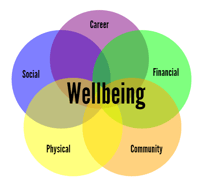 “Your work is going to fill a large part of your life, and the only way to be truly satisfied is to do what you believe is great work. And the only way to do great work is to love what you do.” – Steve Jobs
“Your work is going to fill a large part of your life, and the only way to be truly satisfied is to do what you believe is great work. And the only way to do great work is to love what you do.” – Steve Jobs
We spend a considerable amount of our time working and our careers often play a large role in defining our identity, so it shouldn’t be surprising that our jobs can significantly shape our wellbeing. Yet many people still underestimate the impact of career wellbeing. And traditional wellness programs completely overlook it.
If we truly want to help our employees and our organizations become healthier, we cannot forget about career wellbeing.
Consider an individual in good physical health, is financially secure, and has strong social relationships. If you are looking at the elements of wellbeing, you might think this individual is thriving. But they do not enjoy their job. They do not like what they do. This unhappiness related to work can cause them to worry in their free time, which can in turn cause stress and be detrimental to their physical health. They may find themselves spending much of their social time complaining about work, which could take a toll on their relationships.
 Looking at this scenario, you can start to see how important career wellbeing becomes. Over time, it can cause damage to the other elements. Each of the five aspects of wellbeing are important, but through their research, Tom Rath and Jim Harter of Gallup discovered individuals with high career wellbeing are more than twice as likely to be thriving overall. Their research also found that wellbeing recovered more rapidly following the death of a spouse than it did from a lengthy period of unemployment. Clearly, career wellbeing is critical.
Looking at this scenario, you can start to see how important career wellbeing becomes. Over time, it can cause damage to the other elements. Each of the five aspects of wellbeing are important, but through their research, Tom Rath and Jim Harter of Gallup discovered individuals with high career wellbeing are more than twice as likely to be thriving overall. Their research also found that wellbeing recovered more rapidly following the death of a spouse than it did from a lengthy period of unemployment. Clearly, career wellbeing is critical.
How can you help improve career wellbeing within your organization?
- Assist employees in identifying their strengths and interests.
- Encourage employees to apply for internal opportunities, when they become available, based on those strengths and interests.
- Work with employees to develop a career action plan.
- Offer opportunities for skill building and continuing education.
- Develop ways to help employees feel valued. For example, implement a formal way of recognizing a job well done. This doesn’t have to be financial, it could simply be via your intranet or company newsletter. Make sure supervisors and managers are all on the same page and embrace the opportunities to show employees they are valued.
If your employees look forward to what they do each day, it can go a long way to developing their overall wellbeing. Don’t let your wellness efforts stop with physical health. Make a commitment to helping your employees build their career wellbeing.





